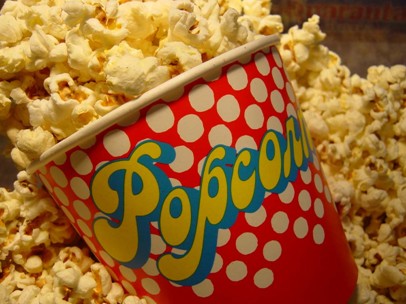
『研究人员发现,生动逼真的广告能使人产生错误的记忆。』
Advertising Can Warp Your Memory
广告能扭曲你的记忆
May 23, 2011 | From US News & World Report

Advertising is everywhere people look. It's along the highway, in storefronts, and online. It can be funny or poignant; it can be annoying. New research shows it can also encourage people to recall things that never happened to them.
Nicole Votolato Montgomery, an assistant professor of marketing at the College of William & Mary in Williamsburg, Va., and Priyali Rajagopal, an assistant professor of marketing at Southern Methodist University, in Dallas, Texas, developed an experiment to test the effects of advertisements on memory.
They asked people to read a very descriptive print advertisement detailing the taste of a fictional popcorn product made by a familiar brand name, then asked a portion of the subjects to taste popcorn labeled with the fictional name. A week later, those who merely read the detailed advertisement were just as likely to report eating this popcorn as people who actually ate it. People who read an advertisement with less vivid imagery were far less likely to report eating the popcorn.
"What we found is that if consumers falsely believe they have experienced this advertised brand, their evaluations of that product are similar to evaluations of products that they actually experienced. That is a fairly unique finding," said Montgomery. "Humans are a lot more inaccurate than we think we are," said Michael Nash, a professor of psychology at the University of Tennessee - Knoxville. He said that the phenomenon of false memories is well-known in psychology, and that he found it interesting that the research extends the concept to marketing.
Anyone who watches the Super Bowl or "Mad Men" probably suspects that advertisers put plenty of effort into the style and substance of their pitches, in addition to researching the effectiveness of their efforts. "I think that advertisers have known that there are benefits to using these very vivid ads," said Montgomery, "but I don't know to what extent advertisers are aware of the fact that these ads can impact memory." Nash said it might be a stretch to connect a false memory of a popcorn brand to the decision to purchase it. "It's another thing to tie an effect to an actual behavior, that is, buying the popcorn," he said.
The researchers also found that when they replaced the well-known brand name with something they invented but kept the same product name and vivid advertisement there was a much lesser effect."Our intent was really just to educate consumers that they need to be vigilant when they're processing high imagery ads, because these vivid ads can create these false memories of product experience," said Montgomery. (428 words)
特别声明:①凡本网注明稿件来源为"原创"的,转载必须注明"稿件来源:育路网",违者将依法追究责任;
②部分稿件来源于网络,如有侵权,请联系我们沟通解决。
25人觉得有用
24
2011.10
『日本大地震引发了人们对于灾难以及核能的新一轮思考,地震中人们面对灾难时的不同态度,也凸显出东西......
24
2011.10
『一系列的研究表明,肥胖及烟酒导致的癌症、糖尿病、心脏病等慢性疾病已不再是富人的专利,这些疾病正......
24
2011.10
『人们习惯于用隐喻的方式,以简单概念为基础去理解一个复杂的概念。在纷繁的世界中,这不失为一种勉强......
24
2011.10
『美国的慈善事业有着源远流长的历史,但慈善事业的实际成效却不及其所展示的那般卓越。专家呼吁,慈善......
24
2011.10
14.共七大――1945年4月23日至6月11日,中国共产党第七次全国代表大会在延安杨家岭中央大礼堂召开......
24
2011.10
10.遵义会议――1935年1月15日至17日,中共中央在遵义召开了政治局扩大会议。 会议内容:①会议......